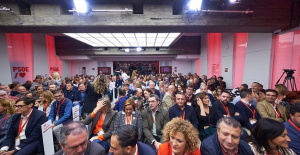He says that Europe complies by disbursing the money but the Government "fails" in its execution and in the lack of "a country project"
MADRID, 2 Oct. (EUROPA PRESS) -
The vice president of the Joint Commission for the European Union and deputy spokesperson for the Popular Group, Pablo Hispán, has accused the Government of Pedro Sánchez of "very poor" management of European funds, while he has criticized him for not listening more to the autonomous communities nor is it taking advantage of that money to promote the modernization and economic transformation of Spain.
"The Government is failing Spanish society and Europe when it does not efficiently manage European funds," declared Hispán, who has also denounced that this money is not reaching Spanish society and companies.
In statements to Europa Press, the leader of the PP has stressed that, at a time when Spain has more than 140,000 million euros to promote the transformation of the economy, the Government has been lost in "an administrative tangle" and in " constant improvisations.
Hispán has justified its criticism of the Executive of the PSOE and United We Can by resorting to data from the General Intervention of the State Administration (IGAE) which, in its opinion, prove that "the management of the funds is very deficient in terms of national accounting and in terms of country project".
Next, he has listed several reasons that, in his opinion, mean that the funds are not being noticed in Spanish society. In the first place, he has pointed out that Sánchez "has not at any time sought an agreement with the PP and the autonomies" when in this matter there should be "a country project, not a government project". "That absence of a truly State vision is the first burden," he added.
In addition, the 'popular' deputy has stated that "there has been no modernization project by the Government" nor have there been "contacts with society". "No one has been counted on," he asserted, adding that these funds are not reaching citizens and SMEs "because of the administrative tangle" and a "historic opportunity" is being wasted.
After the vice president Nadia Calviño advanced a few days ago that the Government is preparing to request the 6,000 million of the third disbursement, Hispán has indicated that Europe "is complying" because it sends the funds but the one who is not complying is the Government "to the time to execute them" and, therefore, "the problem is that they are not reaching Spanish society or companies".
As for whether he believes that the government's economic policy endangers these funds, Hispán has highlighted that "what really endangers is the absence of a country project" and "very mistaken" economic policies in the face of the "historic opportunity " which means receiving "70,000 million in direct subsidies and another 70,000 in credits at a very affordable rate".
When asked if he believes that the Government should design new strategic projects for economic recovery and transformation (Pertes) or reprogram those funds, Hispán has indicated that what the Executive should do is "listen" to the autonomies, beyond crossing letters or photos.
"European funds cannot be made on a stretcher table in Moncloa, but rather we must listen to the administrations that are on the ground and know what the needs of their territory are, their strengths and their weaknesses", he stated, denouncing that there has been "co-governance".
The deputy spokesman for the Popular Group in Congress has assured that the PP will continue to mobilize so that "European funds really respond to the needs of the country" and a "design" of them is made with that objective, "listening to the Autonomous Communities" .
"What cannot be done either is to centrifuge as it did last year, which in December made disbursements to the communities equivalent to what had been the previous eleven months," he asserted, to explain that this action leads to a "huge collapse" in the management of the autonomies when they should have that money available at the beginning of the year.

 Exploring Cardano: Inner Workings and Advantages of this Cryptocurrency
Exploring Cardano: Inner Workings and Advantages of this Cryptocurrency Seville.- Economy.- Innova.- STSA inaugurates its new painting and sealing hangar in San Pablo, for 18 million
Seville.- Economy.- Innova.- STSA inaugurates its new painting and sealing hangar in San Pablo, for 18 million Innova.- More than 300 volunteers join the Andalucía Compromiso Digital network in one month to facilitate access to ICT
Innova.- More than 300 volunteers join the Andalucía Compromiso Digital network in one month to facilitate access to ICT Innova.-AMP.- Ayesa acquires 51% of Sadiel, which will create new technological engineering products and expand markets
Innova.-AMP.- Ayesa acquires 51% of Sadiel, which will create new technological engineering products and expand markets The PSOE is holding a Federal Committee this Saturday that will serve to close ranks with Sánchez so that he does not resign
The PSOE is holding a Federal Committee this Saturday that will serve to close ranks with Sánchez so that he does not resign The Ibex 35 closes the week at its highest since 2015 and is already looking at 11,200
The Ibex 35 closes the week at its highest since 2015 and is already looking at 11,200 RELEASE: Dogfy Diet leads in canine nutrition with revolutionary natural solutions
RELEASE: Dogfy Diet leads in canine nutrition with revolutionary natural solutions STATEMENT: Fernando Belasteguín Curarti ambassador in China
STATEMENT: Fernando Belasteguín Curarti ambassador in China How Blockchain in being used to shape the future
How Blockchain in being used to shape the future Not just BTC and ETH: Here Are Some More Interesting Coins Worth Focusing on
Not just BTC and ETH: Here Are Some More Interesting Coins Worth Focusing on UPV students build a prototype of a wooden house to move to Equatorial Guinea
UPV students build a prototype of a wooden house to move to Equatorial Guinea The UA opens the call for the Impulso 2024 Awards for the best innovative business initiatives
The UA opens the call for the Impulso 2024 Awards for the best innovative business initiatives ALI, virtual assistant from Alicante, internationally recognized by the OECD
ALI, virtual assistant from Alicante, internationally recognized by the OECD Retrópolis brings the golden age of video games and computing to the UPV
Retrópolis brings the golden age of video games and computing to the UPV A million people demonstrate in France against Macron's pension reform
A million people demonstrate in France against Macron's pension reform Russia launches several missiles against "critical infrastructure" in the city of Zaporizhia
Russia launches several missiles against "critical infrastructure" in the city of Zaporizhia A "procession" remembers the dead of the Calabria shipwreck as bodies continue to wash up on the shore
A "procession" remembers the dead of the Calabria shipwreck as bodies continue to wash up on the shore Prison sentences handed down for three prominent Hong Kong pro-democracy activists
Prison sentences handed down for three prominent Hong Kong pro-democracy activists ETH continues to leave trading platforms, Ethereum balance on exchanges lowest in 3 years
ETH continues to leave trading platforms, Ethereum balance on exchanges lowest in 3 years Investors invest $450 million in Consensys, Ethereum incubator now valued at $7 billion
Investors invest $450 million in Consensys, Ethereum incubator now valued at $7 billion Alchemy Integrates Ethereum L2 Product Starknet to Enhance Web3 Scalability at a Price 100x Lower Than L1 Fees
Alchemy Integrates Ethereum L2 Product Starknet to Enhance Web3 Scalability at a Price 100x Lower Than L1 Fees Mining Report: Bitcoin's Electricity Consumption Declines by 25% in Q1 2022
Mining Report: Bitcoin's Electricity Consumption Declines by 25% in Q1 2022 Oil-to-Bitcoin Mining Firm Crusoe Energy Systems Raised $505 Million
Oil-to-Bitcoin Mining Firm Crusoe Energy Systems Raised $505 Million Microbt reveals the latest Bitcoin mining rigs -- Machines produce up to 126 TH/s with custom 5nm chip design
Microbt reveals the latest Bitcoin mining rigs -- Machines produce up to 126 TH/s with custom 5nm chip design Bitcoin's Mining Difficulty Hits a Lifetime High, With More Than 90% of BTC Supply Issued
Bitcoin's Mining Difficulty Hits a Lifetime High, With More Than 90% of BTC Supply Issued The Biggest Movers are Near, EOS, and RUNE during Friday's Selloff
The Biggest Movers are Near, EOS, and RUNE during Friday's Selloff Global Markets Spooked by a Hawkish Fed and Covid, Stocks and Crypto Gain After Musk Buys Twitter
Global Markets Spooked by a Hawkish Fed and Covid, Stocks and Crypto Gain After Musk Buys Twitter Bitso to offset carbon emissions from the Trading Platform's ERC20, ETH, and BTC Transactions
Bitso to offset carbon emissions from the Trading Platform's ERC20, ETH, and BTC Transactions Draftkings Announces 2022 College Hoops NFT Selection for March Madness
Draftkings Announces 2022 College Hoops NFT Selection for March Madness



























